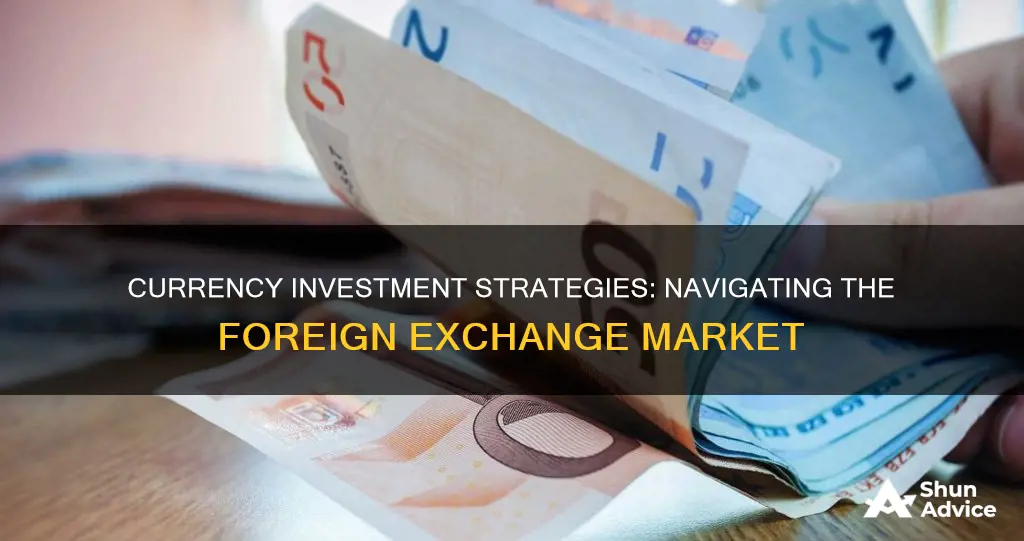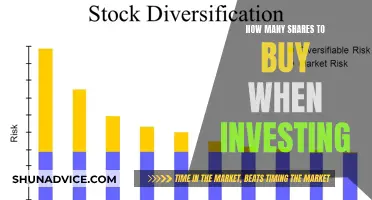
Investing in foreign currency can be a great way to diversify your portfolio. However, it is more complex than trading stocks or mutual funds. The foreign exchange market, or forex, is where the world's currencies are traded 24 hours a day, allowing investors to trade currencies and bet on their movements relative to one another.
There are several ways to invest in foreign currencies. One way is to open a standard forex trading account with a broker. Another option is to invest in mutual funds, exchange-traded funds (ETFs), or exchange-traded notes (ETNs) that focus on foreign currency movements. Less direct currency plays include foreign bond funds and the stocks of global corporations.
It's important to note that investing in currencies carries risks, especially during volatile economic times and periods of high geopolitical tension. The foreign exchange market is highly volatile and can be challenging for beginners due to its steep learning curve. Therefore, it's crucial to carefully assess your risk tolerance and consider seeking advice from a qualified financial advisor before investing in foreign currencies.
| Characteristics | Values |
|---|---|
| Investment type | Forex trading account, CDs and savings accounts, foreign bond funds, multinational corporations, ETFs, ETNs |
| Trading hours | 24 hours a day, 5 days a week |
| Trading pairs | EUR/USD, USD/GBP |
| Risks | High leverage, high volatility, high risk of loss, transaction risk, political risk |
| Benefits | Large and liquid market, diversification, trading hours, low costs |
What You'll Learn

Using a broker
Currency trading, or forex trading, is a complex process that involves buying the currency of one country and selling that of another. It is done through the foreign exchange market, which is managed by banks and other financial institutions. The market operates 24/7 and trades are done electronically.
To begin trading, you will need to obtain cash in your local currency, which you can then convert into other currencies. You can free up cash by selling assets or withdrawing from savings accounts.
Next, you will need to find a currency exchange broker. Online brokers like OANDA and Forex.com offer user-friendly platforms for novices to buy and sell foreign currency. When choosing a broker, look for one that offers low spreads, as forex brokers make money off the spread (the difference between how much a currency can be bought and sold for).
Once you have chosen a broker, you can start placing currency transactions. It is recommended to invest between 5% and 10% of your total account balance in any single currency trade. Keep track of currency rate trends before making transactions, and consider setting stop-loss and take-profit orders to limit potential losses.
Currency trading is considered a risky endeavour, even for expert investors, due to the volatile nature of the market. It is important to be educated about the market and have a solid investment strategy before beginning to trade.
Federal Retirement Funds: Unlocking Investment Strategies
You may want to see also

Long-term investment
Long-term currency investment, or forex trading, is a complex process that requires a good understanding of the market and global economics. It involves buying the currency of one country and selling that of another, with the goal of profiting from fluctuations in currency values. Here are some detailed, direct, and instructive guidelines for long-term currency investment:
Understanding the Basics
Forex trading always involves currency pairs, where one currency is exchanged for another. For example, you might buy US dollars and sell British pounds. The major pairings include the most frequently traded currencies, such as the US dollar (USD), Euro (EUR), Japanese yen (JPY), and British pound (GBP). Trading happens electronically and can be done 24 hours a day, 7 days a week.
Choosing a Broker
It is recommended to use a broker when starting out with forex trading. A broker can guide you through the process and help you navigate the complex nature of currency trading. Ensure that your broker is authorised and regulated to avoid any issues.
There are different strategies for long-term currency investment. One approach is to focus on stable, major currencies such as the British pound, US dollar, Japanese yen, or Swiss franc. These currencies are less risky compared to those from countries with unstable governments, high inflation, or heavy regulations. Another strategy is to consider the economic trends and policies of different countries. Traders can buy and hold a currency for months or years, anticipating long-term gains based on economic factors such as central bank policies, global sentiments, and unemployment rates.
Diversification
To minimise risk, it is generally advised to invest in several different currencies rather than just one. This can be done by creating a currency basket, which is a portfolio consisting of multiple currencies. A typical currency basket may include 5-7 currencies in different proportions, allowing investors to reduce overall losses if one currency decreases in value while another increases.
Long-Term Currency Investment Options
There are various options for long-term currency investment, including:
- Standard Forex Trading Account: Opening an account with a forex broker allows you to trade currencies from around the world.
- CDs and Savings Accounts: Certain financial institutions offer certificate of deposit (CD) accounts that earn interest at local rates in specific countries, providing higher interest rates than traditional CDs.
- Foreign Bond Funds: Investing in mutual funds that purchase foreign government bonds, earning interest denominated in foreign currency.
- Multinational Corporations: Investing in global corporations that conduct business in multiple countries, allowing you to indirectly participate in foreign currency markets.
- Exchange-Traded Funds (ETFs) and Exchange-Traded Notes (ETNs): These are traded like stocks and provide a way to invest in currencies without directly trading on the forex market.
Retiring Rich: Navigating the $1 Million Milestone
You may want to see also

Major, stable currencies
When investing in foreign currencies, it is recommended to stick to major, stable currencies. This is because currencies from countries with unstable governments, inflation history, and high regulations are not prudent investments. For example, investing in Venezuela carries the risk of the government seizing your investment.
Some of the major, stable currencies include:
- The US dollar
- The Euro
- The Japanese yen
- The British pound
- The Swiss franc
- The Canadian dollar
- The Australian dollar
- The New Zealand dollar
- The Norwegian krone
These currencies are often referred to as the "majors" and are the most actively traded and liquid currencies. They are associated with countries that have greater financial power and a high volume of trade conducted worldwide.
It is important to note that while these currencies are generally more stable, they are also more volatile, meaning that price fluctuations during the day can be larger. This means that investors can either make or lose money on these fluctuations.
If you are looking for a safer investment, consider investing in a mutual fund or exchange-traded fund (ETF) that focuses on currency investments. These funds provide diversification and do the macroeconomic research for you, ranking currencies by the highest interest rates.
Another option is to invest in foreign bond funds, which are mutual funds that invest in the bonds of foreign governments. These funds earn interest denominated in foreign currency, and if the foreign currency appreciates relative to your local currency, the earned interest will increase when converted back.
Overall, while investing in major, stable currencies can be lucrative, it is important to carefully consider the risks and potentially consult a broker or financial advisor before making any investments.
NPS: Invest Now or Miss Out
You may want to see also

ETFs and ETNs
Exchange-Traded Funds (ETFs) and Exchange-Traded Notes (ETNs) are two similar investment vehicles that can be used to invest in currencies. Both ETFs and ETNs are designed to mirror the performance of an index or other benchmark, and they trade on major exchanges like stocks. They can be ideal for those who want to invest in currencies without directly trading on the forex market. Here's what you need to know about ETFs and ETNs as a currency investment option:
Exchange-Traded Funds (ETFs):
- ETFs are funds that buy and hold the assets tracked by an index or benchmark. For example, an ETF based on the S&P 500 Index will invest in all 500 stocks included in that index.
- There is a wide variety of ETFs available, including those that invest in stocks, bonds, commodities, or a mix of assets.
- Currency ETFs are designed to track the performance of a single currency against the US dollar or a basket of currencies in the foreign exchange market.
- Currency ETFs can add portfolio diversity and can be used as a hedging strategy against the relative value of a particular currency.
- ETFs have lower fees and expense ratios than mutual funds, making them a more cost-effective option.
- ETFs are typically considered less risky than ETNs because they are not tied to the health of the issuing institution.
- Examples of currency ETFs include the Invesco DB US Dollar Index Bullish Fund (UUP) and the ProShares UltraShort Euro (EUO).
Exchange-Traded Notes (ETNs):
- ETNs are unsecured debt notes issued by banks or other financial institutions. They are similar to bonds in structure.
- Like ETFs, ETNs track an index, and their returns are based on the performance of that index.
- ETNs do not own the underlying assets they track. Instead, they are an investment in debt.
- ETNs have a tax advantage over ETFs because they do not pay taxable dividends and interest. Investors only pay taxes on long-term gains when the ETN is sold or matures.
- ETNs are considered riskier than ETFs because they combine default risk (the risk of the issuer defaulting) and market risk. If the issuing institution goes bankrupt, investors could lose their entire investment.
- Examples of currency ETNs include the iPath GBP/USD Exchange Rate ETN (GBBEF) and various crypto ETNs.
When considering whether to invest in ETFs or ETNs, it is essential to understand the risks and potential benefits of each. ETFs are generally considered less risky and are more established in the market. On the other hand, ETNs offer certain advantages, such as lower tracking errors and favourable tax treatment. It is always recommended to consult with a financial advisor or tax professional before making any investment decisions.
US Risks Falling Behind in AI Race: Time to Invest and Innovate
You may want to see also

Levered currency risks
Leveraged currency investments can be inherently risky. Leveraged products, such as forex trading, magnify potential profits but also increase the potential for losses.
Leverage is the use of borrowed funds to increase one's trading position beyond what would be available from their cash balance alone. In the case of forex, money is usually borrowed from a broker.
For example, if you are required to deposit 1% of the total transaction value as margin and you intend to trade one standard lot of USD/CHF, which is equivalent to US$100,000, the margin required would be US$1,000. Thus, your margin-based leverage will be 100:1 (100,000/1,000).
Leverage involves borrowing a certain amount of the money needed to invest in something. Leverage can amplify both profits and losses. The greater the amount of leverage on the capital you apply, the higher the risk that you will assume.
For example, if you have $10,000 in your account and you open a $100,000 position, you will be trading with 10 times leverage on your account. If you trade two standard lots, which are worth $200,000 in face value with $10,000 in your account, then your leverage on the account is 20 times.
A highly leveraged trade can quickly deplete your trading account if it goes against you, as you will rack up greater losses due to the bigger lot sizes.
Leveraged currency investments are not suitable for all investors. Before deciding to trade foreign exchange, carefully consider your investment objectives, level of experience, and risk appetite. You could sustain a loss of some or all of your initial investment and should not invest money that you cannot afford to lose.
Movie Investment: Why Take the Risk?
You may want to see also
Frequently asked questions
The foreign exchange market is the world's largest financial market, with a daily trading volume of over $6 trillion. It offers investors a way to diversify their portfolios, and operates 24 hours a day, 5 days a week. Trading in foreign currency can also be more cost-effective, as most foreign exchange trading doesn't involve paying a commission.
The foreign exchange market is highly volatile due to economic reports, central bank interventions, and other factors. It also involves high levels of leverage, which can result in greater risk of loss.
You can buy foreign currency directly through a foreign exchange brokerage, or indirectly through exchange-traded funds (ETFs).







